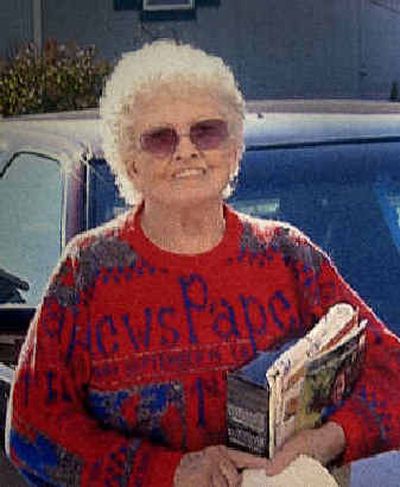She lived to cast one last ballot

Joyce Brown was 85 years old and dying of cancer, but she was determined to vote in the presidential election this year.
“If it wasn’t every day, it was every other day for about two and a half weeks – have you checked the mail? Has it come? Is the ballot here yet?” recalled her daughter, Jo Ann Byler.
An address mix-up had misdirected the absentee ballot, but when Byler went to the Kootenai County elections office to ask for help, they sent a poll worker to Brown’s Hayden home to get her vote the Saturday before the election.
The next day, surrounded by family at her home, Brown died.
Because of a new law enacted by the Idaho Legislature this year, Brown’s vote counts, even though she wasn’t alive on Election Day. Before the law passed, counties had to pull ballots that came from people who died before that date.
“It touched me greatly to think that we had a part in making sure that her last wish was granted,” said DeeDee Beard, Kootenai County elections chief. “How awful if we would’ve had to have reached back in that ballot box, taken it out and not counted it.”
That’s actually the law in many states, prompting election clerks across the country to watch obituaries from day to day, matching them up with voter rolls. This year’s election highlighted the issue in states such as Florida, where there were questions about whether some deceased citizens’ votes were counted, while other weren’t. Idaho has put an end to such questions with its new law, which was sponsored by Rep. George Sayler, D-Coeur d’Alene, and Kootenai County Clerk Dan English.
“I certainly think we did it the right way,” English said.
English recently queried other county clerks around the state, and determined that at least 25 votes from 11 counties were counted this year that wouldn’t have been otherwise.
Those votes included Joyce Brown’s. She was one of three Kootenai County residents who cast their absentee votes, and then died before the election.
“Voting’s pretty important, and obviously it meant a lot to my mother,” Byler said.
Byler was raised in a family that paid attention to politics. “We were Irish, it’s almost you were vaccinated with a political needle,” she said.
She remembers falling asleep under the table as a child, listening in on extended political discussions between her dad and her uncles. “It was a big thing, politics, in my family,” she said.
In those days, it was mainly the men who debated politics, but Byler said her mom had her own opinions. “She had pretty strong feelings, and you didn’t push her around. She may have been 5 (feet) 2 (inches) but she was feisty.”
Brown went back to school in her 30s to earn a cosmetology certificate and fulfill her lifelong dream of becoming a beautician. She treasured her friendships with people of different nationalities and backgrounds.
“She had a real appreciation for people, food, customs, she was absolutely fascinated by how differently people thought and dressed and went through life, and she made that a part of her life,” Byler said. “And she made it part of mine.”
Byler’s parents encouraged their kids to be curious about the world, to learn and to get an education. “I was encouraged to go to school even though my father dug ditches and my mother was a hairdresser,” Byler said. She became the first member of her family to earn a college degree.
Over the years, Byler remembers long talks with her mom about politics. “Sometimes she was a little bit more conservative than I would have preferred,” the daughter recalled with a laugh. But in those discussions, she said, she felt that they were equals – because they were talking about voting, something in which everyone has an equal say.
Byler’s mom moved to Idaho in 2000 to be near her daughter, and after she was diagnosed with cancer a year ago, Byler’s brother, David, also came to Hayden to care for his mother.
For her final year, Brown, who was fond of chocolates and roses, “entertained friends, and wrote, and watched television, and pruned flowers, and talked about the election,” her daughter said.
She particularly looked forward to voting, a feeling she passed on to her daughter.
“My first election was voting for John Kennedy, and I can still remember now that when I walked in that voting booth, it was almost electric. I was making a difference. I had researched this candidate, and I was part of trying to make things better,” Byler recalled. “Voting is really important to me, and it goes back a long way.”
Byler wonders if the desire to cast that last vote kept her mom going at the end. “When she’d done it, she was kind of, ‘OK, I can relax now.’ “
Concerned about the national debt, Social Security and the war in Iraq, Brown surprised her daughter with her final political choices. “This last one, she voted Democrat, which surprised me, but she did.”
She added, “One day after she was able to vote, she passed away, having met her goal – to be home, to be with her family, and to vote.”